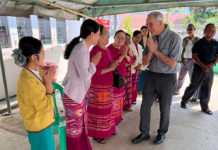Van Jones at SSU
Editor: On Nov. 3, Van Jones delivered a wide ranging speech to students and the general public at Sonoma State University. The location of the speech, the Green Music Center, would have provided a perfect place to address, in-depth, the disquieting paradigm that exists within the environmental movement — can traditional motivations for profit somehow become part of a future where environmental and social justice exist in a meaningful way?
While much of his speech addressed this issue in very broad terms, there was no mention of the fact that most solutions to fossil fuel use have come in the form of expensive, hi-tech devices — devices that are not available to the vast majority of the world population.
Van spoke highly of wind-turbines and PV panels — they could supply all of our energy, he said — but could this really become a reality without subsidies? And if it could, how does it positively affect the many people in places that have had their traditional means of sustenance stripped away, people that have no hope? The subjects he touched upon that really could affect the world in a fundamental way were only related to “green” as much as we might make them related to “green.” He talked about how a small percentage of people, people that could passionately express meaningful truth, how they could affect change; he talked about how he was inspired by great speakers of the past; he talked about the power of connection between peoples’ hearts.
The relation between these subjects and mundane devices like wind-turbines or PV panels is not easy to see. Yet if wind and solar (and other device based solutions) are going to come to make a difference, there must be something powerful pushing them, because at this point, only those that understand the true cost of fossil fuels can see their value.
The comment that a classmate of mine had was, “he had no details, he was making a political speech.” This comment was true, he had no specific details, yet I would argue that the specific details vary greatly from person to person, and from place to place.
The common thread in the message that he delivered was not visible to all and not acceptable to all that understood it.
The common thread in Van’s argument was that, as advocates for a future that includes (and celebrates) the bio-diverse environments that ultimately sustain us, we are in a position where we can affect change. If we can be motivated by something above and beyond material desire, if we can be motivated by a passion for our future and the future of the planet.
Don Osborne
B.A. Environmental Science, SSU 2013
53.9
F
Healdsburg
April 19, 2025







